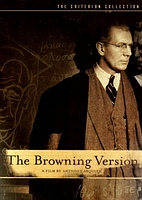LITTLE KNOWN FILMS: THE BROWNING VERSION (1951) U.K. 87 MINS.
Stuffy English private school classics master Andrew Crocker-Harris (Michael Redgrave) is preparing to retire early due to ill-health. Considered a supercilious bully by his students and a stuffy buffoon by his colleagues, the Crock, as he is known, or worse, has distanced himself from all human emotion, due, in part, to his wife, Millie (Jean Kent) having an affair with one of the younger — more popular and lenient — masters, Frank Hunter (Nigel Patrick). However, when a student, Taplow (Brian Smith), thanks him with a gift of Browning’s translation of Agamemnon, the Crock’s feelings are reignited and he confronts his utter failures as a teacher, a husband, and a man.
Generally described as a study of repression and redemption, The Browning Version is in many ways an introduction to a particularly English personality trait: the emotional dry stick. Michael Redgrave is as dry as old dust as he creates a character of greater complexity than appearances suggest. The depth of his self-awareness is revealed late in the film, when he begins to admit to himself, and even to others, what a fool he has been. What a fool and what a failure.
It’s a remarkable piece of writing by Terence Rattigan, the famous English playwright, who greatly expanded his original material which took place on a single stage set. Noted British director Anthony Asquith (Pygmalion) drags us through such an arid landscape and keeps us interested, involved and finally moved. It’s a character study — and a study in failed marriage. Jean Kent is excellent as the dissatisfied wife who latches onto the science teacher in an ever more desperate lunge for love — or at least a show of it.
Young Brian Smith is also outstanding as the student whose sincere affection for the old Crock, Andrew Crocker Harris, plays such a crucial role in unlocking the older man’s self. Asquith keeps the focus tight and the characters silhouetted against the setting of a school where tradition, learning and not much visible emotion are the order of the day.
This film is widely regarded as one of the best British pictures ever made and yet is rarely seen. It was remade in 1994 with Albert Finney but the original is far superior and worth tracking down. Luckily, the Palisades library is the only one in the county to have a copy of it. It won best actor and best screenplay in the Cannes Film Festival of 1952. See it and you will know why.


